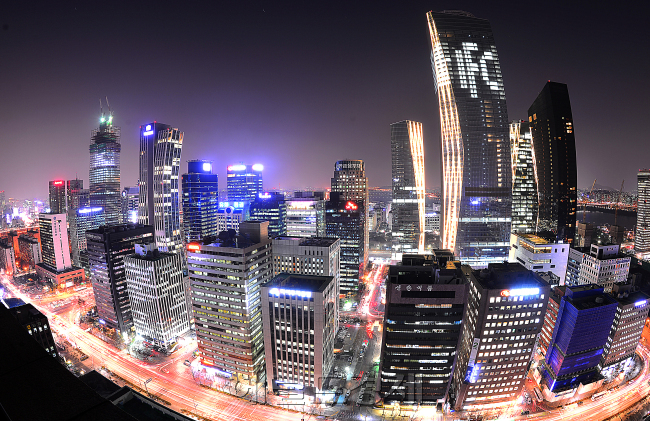The size of annual dividends of Kospi-listed firms is likely to jump for the sixth consecutive year this year, partly spurred by the companies’ efforts to enhance responsible shareholder engagement since 2017, data showed Tuesday.
 |
(Yonhap) |
The volume of dividends from ordinary shares and preferred shares trading on the Kospi throughout 2018 will unprecedentedly top a combined 30 trillion won ($26.6 billion), unless the year-end dividend shrinks by over 4 percent to 20.9 trillion won compared to the previous year, according to data from the Korea Exchange.
Of some 800 companies whose shares are traded on the Kospi, constituents of the benchmark Kospi 200 index, or the 200 blue-chip shares, are projected to hand out 26.9 trillion won of dividends to shareholders, according to an earlier estimate by Shinhan Financial Investment.
In 2017, the combined volume of interim and year-end dividends reached 26.4 trillion won, also setting an all-time high at the time. Over the past five years since 2012, total annual dividends skyrocketed by 229.5 percent, riding a constant uptrend.
Specifically, there has been a sudden upswing in interim dividends of companies trading on the Kospi. In 2018 alone, the total volume of midyear and quarterly dividends by 36 Kospi-traded companies, including Samsung Electronics, came to 9.1 trillion won. This was nearly double compared to a year prior at 4.6 trillion won and nearly 10 times higher than in 2016, according to data from the Financial Supervisory Service.
Since 1998, Korea has adopted a policy that allows publicly traded companies’ midyear dividends. Quarterly dividend payout has been permitted since 2004.
But it was only since 2017 that the volume of interim dividends came under the spotlight.
Notably, market bellwether Samsung Electronics’ interim dividend rose sharply, as the figure soared to 7.2 trillion won in 2018, up from 2.9 trillion won in 2017 and 141.6 billion won in 2016.
This comes in line with the tech firm’s pledge early this year to raise dividends to some 9.6 trillion won as part of its stronger shareholder return policy, since liberal President Moon Jae-in took office in May 2017. Samsung Electronics distributed dividends worth 5.8 trillion won to investors through the financial year of 2017, up 46 percent compared to a year prior.
Meanwhile, the dividend yield in Korea is also expected to surge, due to high dividend payout coupled with a domestic market slump.
For the past 10 years since 2007, the average dividend yield on the Kospi market had hovered in the 1-1.7 percent range. Chang Hee-jong, an analyst at Hi Investment & Securities, estimated the dividend yield on the Kospi in 2018 to be 2.4 percent on average.
Investors in Korean stocks must obtain at least one share by Wednesday to be granted year-end dividends for the financial year of 2018.
By Son Ji-hyoung
(
consnow@heraldcorp.com)








![[Today’s K-pop] Blackpink’s Jennie, Lisa invited to Coachella as solo acts](http://res.heraldm.com/phpwas/restmb_idxmake.php?idx=644&simg=/content/image/2024/11/21/20241121050099_0.jpg)